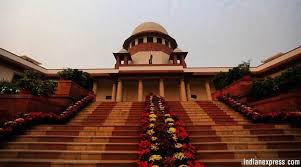Under Section 138 read with Section 141 of the Negotiable Instruments Act, 1881 (Para 2)
High Court declined to quash the complaint qua the appellant in exercise of the power under Section 482 of the Code of Criminal Procedure (Para 2)
The appellant set up twin grounds to seek quashment of the complaint against him; firstly, that he had resigned from the partnership firm on 28.05.2013 whereas the cheque in question was issued on 21.08.2015 and secondly, that the complaint is devoid of mandatory averments required to be made in terms of sub-Section 1 of Section 141 of the NI Act, as relates him. (Para 4)
This Court has repeatedly held that in case of a Director, the complaint should specifically spell out how and in what manner the Director was in charge of or was responsible to the accused company for conduct of its business and mere bald statement that he or she was in charge of and was responsible to the company for conduct of its business is not sufficient. (Vide National Small Industries Corpn. Ltd. v. Harmeet Singh Paintal). In the case on hand, particularly, in Para 4 of the complaint, except the mere bald and cursory statement with regard to the appellant, the complainant has not specified her role in the day-to-day affairs of the Company. We have verified the averments as regards to the same and we agree with the contention of Mr. Akhil Sibal that except reproduction of the statutory requirements the complainant has not specified or elaborated the role of the appellant in the day-to-day affairs of the Company. On this ground also, the appellant is entitled to succeed.” (Para 14)
In the light of the dictum laid down in Ashok Shewakramani’s case (supra), it is evident that a vicarious liability would be attracted only when the ingredients of Section 141(1) of the NI Act, are satisfied. It would also reveal that merely because somebody is managing the affairs of the company, per se, he would not become in charge of the conduct of the business of the company or the person responsible to the company for the conduct of the business of the company. A bare perusal of Section 141(1) of the NI Act, would reveal that only that person who, at the time the offence was committed, was in charge of and was responsible to the company for the conduct of the business of the company, as well as the company alone shall be deemed to be guilty of the offence and shall be liable to be proceeded against and punished. In such circumstances, paragraph 20 in Ashok Shewakramani’s case (supra) is also relevant. After referring to the Section 141(1) of NI Act, in paragraph 20 it was further held thus: “20 On a plain reading, it is apparent that the words “was in charge of” and “was responsible to the company for the conduct of the business of the company” cannot be read disjunctively and the same ought be read conjunctively in view of use of the word “and” in between.” (Para 16)
Since the averments in the complaint are insufficient to attract the provisions under Section 141(1) of the NI Act, to create vicarious liability upon the appellant, he is entitled to succeed in this appeal. We are satisfied that the appellant has made out a case for quashing the criminal complaint in relation to him, in exercise of the jurisdiction under Section 482 of Cr.PC. (Para 17)
SUPREME COURT OF INDIA
2023 STPL(Web) 333 SC
[2023 INSC 890]
Siby Thomas Vs. M/S. Somany Ceramics Ltd.
Criminal Appeal No. 3139 of 2023 (@Special Leave Petition (Crl.) No.12 of 2020)-Decided on 10-10-2023
https://stpllaw.in/wp-content/uploads/2023/10/2023-STPLWeb-333-SC.pdf







